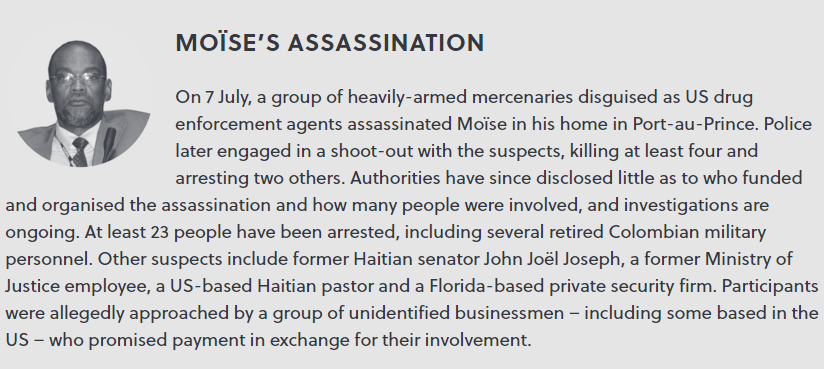Troubled times: Haiti's ongoing crisis
When mercenaries assassinated President Jovenel Moïse on 7 July, it was just one of many stumbling blocks that the country has faced in the past few years, which include months of violent unrest over food and fuel shortages, election delays and high-profile corruption scandals. The Covid-19 pandemic has further damaged the economy despite ongoing international aid programmes. International institutions and Haiti’s allies, including the EU and US, have condemned the assassination and have stated their commitment to financially supporting the country while it sets up a new government. Yet, the US has rejected Haiti’s calls for military aid to help protect key infrastructure and stabilise the security environment while it prepares for elections. Haiti’s frail state, weak government and under-resourced security establishment will need to tackle the fallout of Moïse’s assassination on its own.

CRISIS OF SUCCESSION
Haiti’s government suffers from chronic infighting and power struggles, which was evident in the aftermath of Moïse’s death. Interim Prime Minister Claude Joseph quickly declared a countrywide state of emergency, but the public, senior officials and even some gangs rejected his leadership. A week before his death, Moïse had named Ariel Henry, a politician and neurosurgeon, as Prime Minister. In another direct challenge to the interim government, a group of parliamentarians announced their recognition of Joseph Lambert – former head of the now-dissolved Senate – as interim president on 9 July. Protests promptly forced Joseph to step down and Henry was sworn in on 21 July.
However, political stability is far from guaranteed. Although Henry claimed that he will facilitate elections within 120 days, this timeframe is ambitious. He will first need to reform the electoral council, which Moïse illegally appointed by decree in September 2020 when he bypassed the Supreme Court and the Constitution. This will delay election preparations, as the Council should be appointed only after consultations with civil society. Even if this requirement is met, it is unclear if the interim government has the resources, legitimacy or political will to hold free and fair elections. Haiti remains in the midst of the pandemic that is straining the country’s health resources, and thousands of people have been displaced by ongoing insecurity and gang violence. These obstacles could further hinder election logistics and voter turnout.
DETERIORATING SECURITY SITUATION
Haiti’s weakened government and corrupt state institutions have created opportune conditions for gangs to strengthen their foothold in society and in the political sphere. It is common for politicians to use gangs to secure their interests in communities in exchange for financial gain, legal protection and other benefits. Moïse had even been accused of providing protection to the G9, a coalition of nine gangs led by a former police officer. However, Moïse’s death and the uncertainty surrounding the new government may throw gangs’ symbiotic relationship with politicians, and their associated access to political resources, into disarray. Coupled with high levels of internal fragmentation among gangs, competing factions may seek to leverage the ongoing political uncertainty to reassert their territorial control and bolster their relationship with Moïse’s potential successors. This will drive further gang violence in the coming year, as has already been seen is a recent surge in gang kidnappings for ransom and shootouts between rival groups in the capital.
Haiti’s humanitarian crisis will also continue to prompt regular disruptive protests in the coming months, particularly as state resources will likely be siphoned to set up elections and bolster healthcare infrastructure.
INVESTMENT CLIMATE
Haiti remains one of the poorest countries in the world, ranking 170 out of 189 countries on the Human Development Index in 2020. Its economy – which relies heavily on foreign aid – has faced multiple shocks since anti-government protests accelerated in mid-2018, including a 1.7 percent contraction in 2019 and a further estimated 3.8 percent contraction in 2020 (in part driven by the Covid-19 outbreak). Foreign direct investment has also declined amid unrest, with the UN reporting a decrease from USD 105 million in 2018 to USD 75 million in 2019. The new government will need to contend with further economic decline, and a poverty rate of around 60 percent, although it is unlikely that it will be able to make any significant gains in these areas while political and economic instability continues.
Elections and a new government will not easily resolve the longstanding grievances that have driven anti-government protests. The new regime will still face extremely low levels of political legitimacy and it is unclear if the new government will retain the support of the population or the armed forces. With the country’s precedent for coups, these dynamics will pose a continued threat to any incoming government. The new government will further lack the resources needed for state-building and to tackle instability. FDI is already in decline, and renewed prospects for lingering political and economic turmoil will continue to decrease Haiti’s appeal as an investment destination in the coming year.
